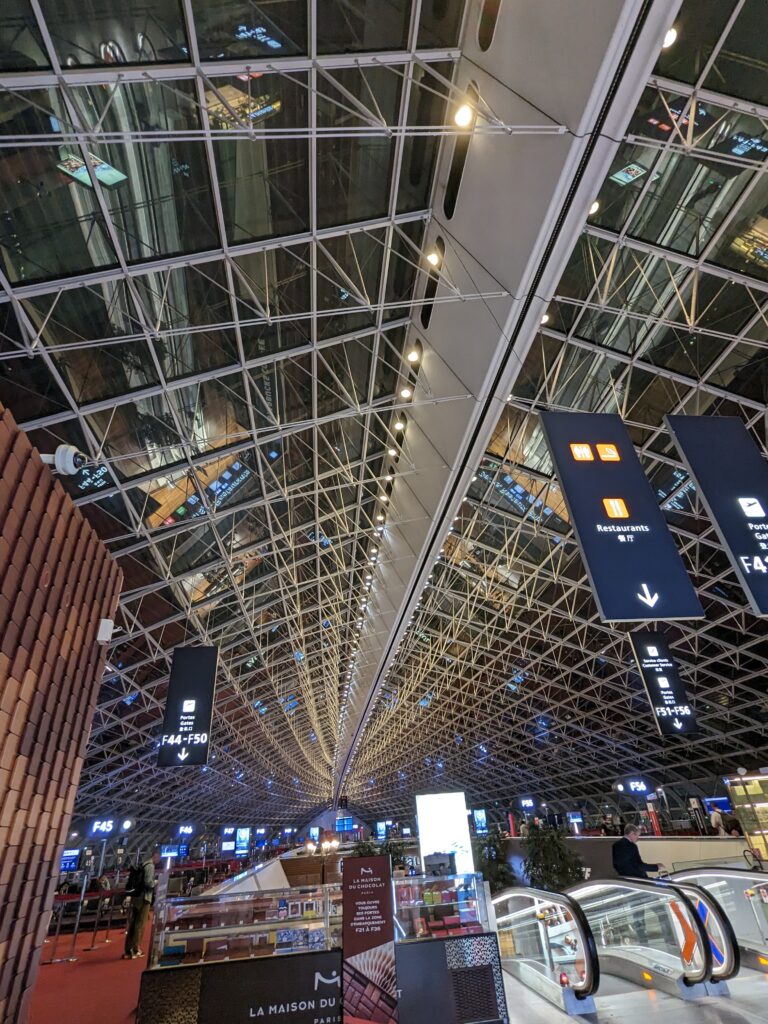Talking to Strangers
I had an extended conversation on an airplane a few days ago, with someone I met because we happened to be seated next to each other. I’ve found myself mulling over how pleasant it was to chat with a stranger for hours and trying to figure out why it felt so remarkable.
As a younger woman, I largely felt accosted by the insistent conversation efforts of men roughly the age of my father. They smiled indulgently when I said I was a professor and told me I didn’t look old enough for that job. “Old enough” was often code for “dowdy enough.” Sometimes it meant “male enough.”
For the record: neither age, personal style, nor gender are prerequisites for a job as a professor.
Such men are certain that everyone woman finds the statement that she looks “so young” an immense compliment. They invariably asked what I taught. I said, “English literature.” They said, with a warm sense of conviction that they had found a way into deeper conversation, “I was always terrible at English class.” And then they asked me to name my favorite book.
Almost no one who teaches books for a living has a favorite book, any more than I imagine poets have a favorite word, or surgeons have a favorite organ, or gardeners have a favorite flower. I could be wrong about poets and surgeons and gardeners. But it seems impossible to think that if one has chosen reading and writing as the twin processes of a lifetime, a single production of a single pen could be a “favorite.”
To shut down this conversation, I generally mention a book that I assume my auditor will not have heard of. (Miss Marjoribanks by Margaret Oliphant is a good choice.) Occasionally I’ve tried to explain that there are so many different moods and modes, so many reasons to read, so many occasions on which this book or that was the perfect thing despite its having seemed unreadable six months before. Most of these men are uninterested in this idea.
If it’s not a misguided or condescending flirtation, plane conversations in my experience can be other forms of entrapment: proselytizing, or two hours of grandchildren-picture-sharing, or political invective that ought to be kept to oneself.

But the other day was different. That we were on a flight at all seemed half miraculous just four days after the computer disaster that downed planes and banks and hospitals the world over. We’d both had flights cancelled out from under us, as had tens of thousands of other people, and both of us were slightly giddy at the fact that we were no longer stranded.
(I was surely the more giddy, though my seatmate did not know it. Because while he, presumably, had purchased the first class seat in which he was comfortably situating himself, I had had the great good fortune to be rebooked, courtesy of my cousin M, on the very last seat on the last flight that had not been cancelled that day from the Twin Cities into New York. I have no doubt that someone else, who did not need their cousin to make a call to the special number that gets one greeted by the robovoice, “Welcome back, M,” would have been rebooked from their cancelled first class seat into this one, had my cousin not gotten to the queue first.)
Anyway, there we were, comfortable in our seats, and making small talk as one does when the plane hasn’t taken off, no one is reading or texting, and it only seems polite to commiserate. “Was your flight cancelled too?” “Where are you headed?” and so on.
Only this time, the conversation just kept going. We talked about books and filmmaking (he was a cinematographer, I learned). Scouting locations led to destinations for a family vacation led to “oh I’ve been where you’re going, you should see this park and that museum” led to “what great books have you read lately” led to “remember when traveling meant a tattered guidebook and no sense at all of where you would sleep when you first got off the train in a new city?”
Ah. In addition to pondering why the conversation felt surprising, that thread has kept me thinking.
Remember when traveling meant a tattered guidebook and no sense at all of where you would sleep when you first got off the train in a new city?
It turned out that we both had stayed in the Pink Palace on Corfu within a year of one another, which is not as coincidental as it seems, in the sense that pretty much every college kid with a Eurail pass and a Let’s Go Europe in the late 80s and early 90s wanted to stay at the hotel beyond the end of the road. The one that required a taxi to stop, point down the beach, and tell you that you’d have to hike a few hundred yards further to find the place. But that you couldn’t miss it. Because, of course, it was pink. Maybe it was a coincidence that we were sitting next to each other and talking about travel, that we were enough the same age to have traveled in much the same way all those years ago. That we similarly lamented the loss of the intoxicating freedom to wander places without anyone but the friend you were traveling with knowing where you were. That we wished our children could have that, and that we knew they simply never would in this age of cell phones.
“I can’t believe you stayed in the Pink Palace too,” he marveled, shaking his head slightly. But given that we were both on Corfu then, the Pink Palace part seems the least of the coincidences.
We (by which I mean, our generation) surely did stupid things within the freedom we had then. But there was such a wonder in the wandering. The getting on a train when you felt like leaving a place and the getting off when you saw something you liked, or had reached the station where the most intriguing thing the guidebook had mentioned was something you felt you simply must see or swim in or eat.
I remember so vividly the conversations on those trains. I have no recollection of their content. But I recall as if it were yesterday how easy they were. In a train compartment with fellow travelers for whatever leg of the journey you were sharing, you just started talking. You learned about their girlfriends and their hobbies, the places they’d just been and what they were most excited to see next.
They told you the story of the time their brother got in trouble for something they did.
Or of the disastrously cold crossing from Brindisi to Corfu on the overnight ferry, when they’d booked only a deck pass and so were not allowed inside, and then figured out too late that the wind off the Adriatic is no joke at midnight. Fortunately, their new friend, also met on the trains, knew someone with a tent who loaned them a fly sheet, and thus they huddled in a makeshift shelter under an exterior staircase wearing four layers of clothes because they had no blankets, and laughing until they fell asleep in a heap on their packs. (I remember this story because it is mine, and I have dined out on the long version of it for years.)
It has been decades since I have been on a form of public transport and simply struck up a conversation that felt genuine and interesting and easy and rambling in the most delightful of ways. A conversation, I have realized, as I’ve been thinking about travel and talking to strangers, that is predicated simply on conversing.
This is possibly because I am no longer so young.
But surely not entirely. I was, after all, a whole decade older when men started leering, “you are so young” than I had been when I was on the trains, immersed in talking half the night with people I would never see again, and whose last names I cannot remember.
It makes me wonder if it is not age but the age, the time we were in, that made possible those magnificent, thoughtful, ephemeral conversation. Ones that demanded nothing more than engagement in the moment because the present was sufficiently interesting, and the journey had an endpoint.
We finally introduced ourselves (first names only) as we were waiting to deplane. We shook hands again in the terminal, smiled, and turned in different directions.

For days, I have been thinking about that conversation, appreciating its rarity. Lamenting its rarity.
I am reminded of the epigraph for Howard’s End—Only connect!—and left wondering how we find more such moments of connection in a world where, ironically, our online connectivity seems to have all but destroyed striking up a conversation with a stranger.
The memories of all that travel, the story of the accidental first class seat, the charm of a conversation of finite length and lovely depth makes me want to try.